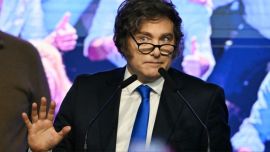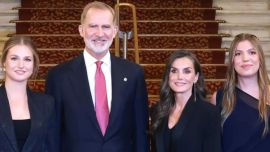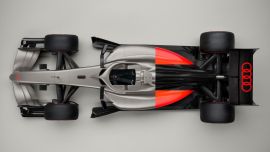A court on Tuesday found Vice-President Cristina Fernández de Kirchner guilty of corruption offences, sentencing her to six years in prison and handing her a lifetime ban from holding political office.
The former president, who denies the allegations against her and dismissed the trial as a political witch hunt, was found guilty of the crime of “fraudulent administration to the detriment of the state.” The three-panel judge rejected the charge that she ran a criminal organisation, which would have led to a more severe punishment.
She is unlikely to spend any time behind bars, however, given that she holds congressional immunity due to her role as the nation’s deputy leader and head of the Senate. The vice-president still has several avenues for appeal, and will likely take the case all the way to the Supreme Court, but the ruling places a question mark over her political future.
Fernández de Kirchner responded to the verdict by saying that "none of the lies were proven" and that she had been convicted by a "legal mafia."
"I won't be a candidate for anything, not a senator, or a deputy or president of the nation" in the 2023 general elections, she said in an hour-long broadcast immediately after the court had ruled.
The former president, 69, was accused of fraudulently awarding public works contracts in her stronghold province of Santa Cruz during her two terms as president (2007-2015).
Prosecutors had asked for a 12-year jail term and lifetime ban from politics and have already indicated they will seek a harsher sentence on appeal. During the trial, lead prosecutor Diego Luciani denounced what he branded "a system of institutional corruption" and "probably the largest corruption operation" in the country’s history, with "systematic irregularities in 51 calls for tenders" over more than a decade.
In total, 13 people were charged with two crimes: illicit association and fraudulent administration. Among the 12 other defendants were former Federal Planning minister Julio De Vido, former Public Works secretary José López and Lázaro Báez, the businessman allegedly at the heart of the corrupt organisation.
Eight of the co-accused were found guilty and sentenced to between three and six-and-a-half years in jail. Three were released and another had their case dismissed as it had passed the statute of limitations.
Báez and López were handed six years by the court for their crimes. De Vido, former public works undersecretaries Abel Fatala and Carlos Santiago Kirchner and Santa Cruz provincial roads agency chief Héctor Garro were among those acquitted.
Foregone conclusion
Fernández de Kirchner has been at the centre of national politics for two decades, drawing love and hatred in equal measure. She said the trial is a clear example of “judicial and political persecution” and that the result was a foregone conclusion.
"Obviously, there will be a conviction," she told the Brazilian daily Folha de São Paulo in an hour-long interview published on Monday.
The court, led by judges Rodrigo Giménez Uriburu, Andrés Basso and Jorge Gorini, have not published their grounds for the ruling. The judges have a period of 40 working days to make their ruling known, which – taking into account the proximity of the January judicial holiday – stretches the deadline to the first quarter of next year.
"The verdict will have a strong political impact" although "the chances of her being arrested for the sentence are non-existent," said political analyst Rosendo Fraga of the University of Buenos Aires.
President Alberto Fernández, speaking in the aftermath of the verdict said that “an innocent person has been convicted.”
He said Fernández de Kirchner was “someone who the powers that be have tried to stigmatise through the media and persecuted through complacent judges who ride around in private planes and luxury mansions on weekends," in a post on his social media accounts.
“Today I support and stand in solidarity with Cristina Kirchner, knowing that she is the victim of an absolutely unjust persecution. I know of her innocence. All good men and women who love democracy and the rule of law must stand by her side," he declared.
The accusation against the accused focused on the hypothesis that Fernândez de Kirchner had deliberately favoured Báez in the awarding of tenders for public works projects. The period investigated included the former president’s eight years in office, 2007 to 2015, and the preceding four years when her late husband Néstor Kirchner, who died in 2010, was head of state.
Beginning in May 2019, the same month in which the former two-term head of state announced the presidential ticket headed by current President Alberto Fernández, the trial has loomed over Fernández de Kirchner’s entire vice-presidency.
Gregorio Dalbón, one of the vice-president’s lawyers, said that the court must acquit his client if it followed the “rule of law.” He declared that "there is no evidence to convict her, [but] if the trial is going to be political, of course there will be a conviction."
Protected by her privileges as Argentina’s deputy leader and head of the Senate, Fernández de Kirchner cannot be arrested ahead of her sentence being confirmed by the Supreme Court, a process which could take up to six years or more, said Fraga.
Argentina holds general elections in 2023, and the political veteran can still run for any elective office, though on Tuesday she ruled that out.
Some analysts observed that given the length of the anticipated appeal process that lies ahead, Fernández de Kirchner could still run for any elected office in 2027 and qualify for immunity from arrest before her case is finally settled.
‘Firing squad’
Fernández de Kirchner argues that the multiple corruption allegations she has faced in the courts form part of a campaign of “lawfare” waged by her political opponents.
"This court has been a true firing squad," the veteran politician said during her final remarks to the chamber, accusing prosecutors of having "dedicated themselves to disrespecting and insulting me."
On Monday, President Fernández used a national broadcast to call for an investigation into alleged judicial and political collusion between members of the opposition, judges and media moguls. The demand responded to press reports on leaked messages from the Telegram messaging app that indicated members of the group were conspiring to cover-up a meeting at the Patagonian residence of British billionaire Joe Lewis at Lago Escondido.
Security forces were deployed in large numbers outside the Comodoro Py federal courthouse in the lead-up to the verdict with expectations of demonstrations in response to an adverse ruling.
Several hundred supporters gathered outside the Comodoro Py federal courthouse before the verdict was read.
"I am here to defend Cristina. We defend her for what she has done and what we know she can continue to give. She is a transparent person. If she is on trial, it's because of everything she has given to the people," said 50-year-old self-employed tradesman Marcelo Graziano.
Fernández de Kirchner came to prominence as part of the ultimate political power couple, with she and her late husband serving a collective 12 years in the Casa Rosada.
To much of her working-class base, they were the saviours after Argentina's 2001 economic meltdown and social unrest that followed the largest debt default in history, standing up for the downtrodden against bullies both foreign and domestic.
Her detractors see her as a corrupt, overbearing interventionist who steered the country back towards economic ruin through debt-fuelled spending sprees.
When prosecutors announced they were seeking a 12-year jail term in late August, mass daily demonstrations took place outside Fernández de Kirchner's apartment building in the upmarket City neighbourhood of Recoleta.
During one of these protests on September 1, a man emerged from a crowd of supporters, pointed a revolver in her face and pulled the trigger – but the gun did not fire.
Four people have been charged with involvement in the attack.
– TIMES/AFP/NA




















Comments